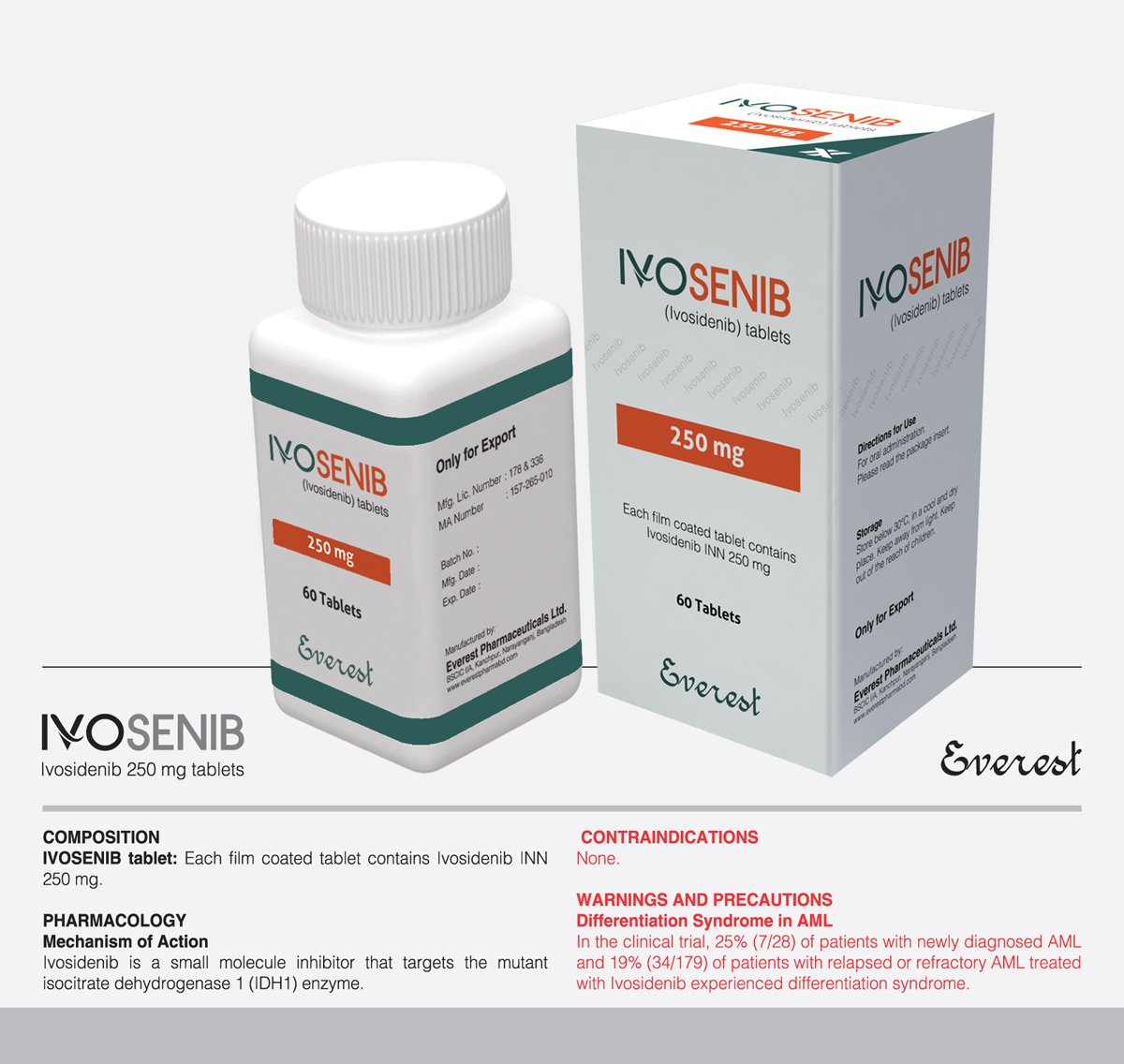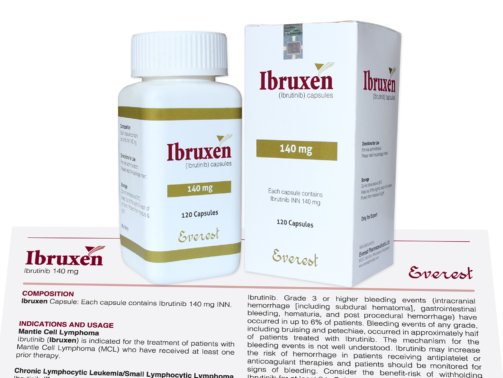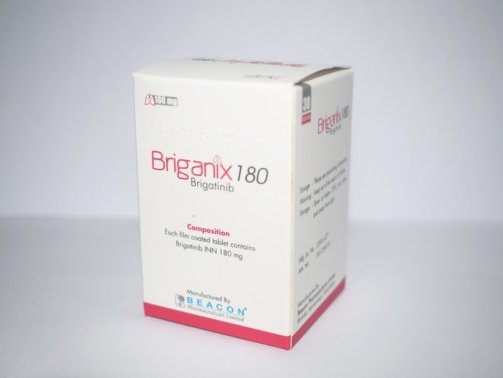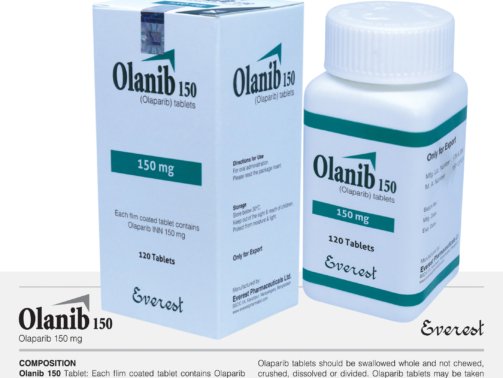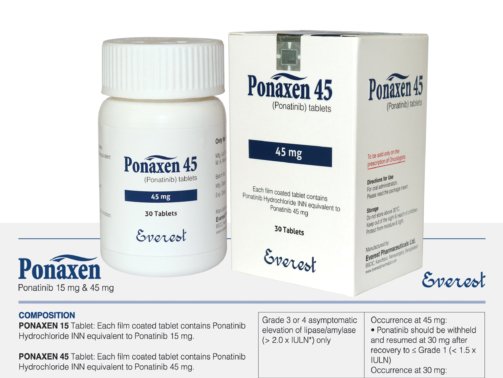Ivosidenib 250 mg (Tibsovo)
0.00$
Ivosenib, also known as Ivosidenib, is indicated for adults with relapsed or refractory acute myeloid leukemia harboring an isocitrate dehydrogenase-1 (IDH1) mutation. Acting as a selective inhibitor of mutant IDH1 enzymes, Ivosenib restores normal cellular differentiation by blocking abnormal enzyme activity. Administered orally at 500 mg once daily, this treatment should be continued until disease progression or intolerable side effects occur. While generally well-tolerated, common side effects include fatigue, nausea, and diarrhea, with precautions advised for potential adverse reactions such as differentiation syndrome and hepatotoxicity. Overdose management involves supportive care, highlighting the importance of close monitoring during treatment.
Ivosidenib, sometimes referred to by its International Nonproprietary Name (INN) as Ivosidenib, is a drug that is mostly used to treat hematologic tumors, particularly acute myeloid leukemia (AML) patients. This medication belongs to a class of drugs known as targeted treatments, which are intended to target particular cancer cell abnormalities. Patients with AML who have a particular genetic mutation in the isocitrate dehydrogenase-1 (IDH1) gene, which occurs in a fraction of AML cases, are treated with Ivosidenib ..
Mechanism of Action
Ivosidenib functions by preventing the mutant IDH1 enzyme, which is crucial in cellular metabolism, from functioning. IDH1 typically transforms isocitrate into alpha-ketoglutarate, which is essential for healthy cellular operation. The aberrant metabolite 2-hydroxyglutarate (2-HG), which is produced by the enzyme IDH1 in malignancies with a mutant IDH1 gene, can interfere with regular cellular processes and aid in the onset and spread of leukemia.
Ivosidenib reverses some of the metabolic irregularities that permit cancer cells to proliferate out of control by impairing the mutant IDH1 enzyme, which lowers the generation of 2-HG. By restoring normal differentiation and function to the impacted cells, this approach helps to delay or even reverse the leukemia’s growth.
Indications and Uses
Adult individuals with relapsed or refractory AML who have an IDH1 mutation are the main patients for whom Ivosidenib is prescribed. In roughly 6–10% of AML patients, this mutation is present. Determining whether Ivosidenib is appropriate for treatment depends critically on the existence of the IDH1 mutation. Clinical trials have demonstrated the drug’s potential as a useful treatment for these individuals, particularly those who have not responded to chemotherapy or other treatments.
Apart from AML, Ivosidenib is being researched for its possible application in the treatment of glioma and cholangiocarcinoma (bile duct cancer), two other tumors that might have IDH1 mutations. Although research on these indications is ongoing, preliminary findings indicate that Ivosidenib may be useful in treating other cancers that have the same metabolite.
Dosage and Administration
Ivosidenib is sold in tablets, usually at dosages of 250 mg. Two 250 mg pills per day, or 500 mg once daily, is the recommended dosage. In order to maintain constant levels of the medication in their system, patients are encouraged to take the medication orally at the same time every day, with or without meals.
Depending on each patient’s tolerance, adverse effects, and reaction to treatment, the dosage may be changed. Patients are typically recommended to skip the missed dose and proceed with the next regular dose if a dose is missed. It’s crucial to avoid taking two doses at once to make up for missing one.
Because Ivosidenib can alter liver enzymes, patients receiving treatment should be constantly watched by medical professionals for any negative side effects, including abnormalities in liver function. To evaluate the patient’s reaction to treatment and make sure the medication isn’t having negative side effects, routine blood tests are necessary.
Side Effects
Ivosidenib may have adverse effects, much like most drugs. Ivosidenib’s most frequent adverse effects are related to liver function and gastrointestinal distress. These consist of:
Weariness
Vomiting and feeling queasy
Low red blood cell count, or anemia
Increased liver enzyme levels, which could be a sign of liver disease
Increased white blood cell count, or leukocytosis
More serious adverse effects are possible in certain situations. These could consist of:
Differentiation syndrome is a potentially fatal illness that can result in organ malfunction, fever, and breathing difficulties. Patients usually experience it when their leukemia cells start to mature as a result of their treatment.
Liver toxicity, which necessitates routine monitoring of liver enzymes throughout treatment, includes jaundice (yellowing of the skin and eyes) and increased liver function tests.
It’s critical to get medical help right away if any of these serious side effects manifest. In some circumstances, it might be necessary to lower the Ivosidenib dosage or stop the medication altogether.
Clinical Efficacy
Ivosidenib’s therapeutic effectiveness has been proven in a number of clinical trials, most notably in patients with IDH1 mutations who have relapsed or refractory AML. Ivosidenib demonstrated a noteworthy response rate in a critical phase 1 research, with most patients experiencing either partial or total remission. The medication’s capacity to enhance survival outcomes for these individuals has been validated by additional research, particularly when paired with other treatments like chemotherapy.
It has been demonstrated that Ivosidenib is a viable alternative for patients who have tried every other kind of treatment, offering them a chance to recover or live a better life. Its precise mode of action, which targets the underlying genetic mutation that causes the disease, is largely responsible for its success.
Conclusion
For AML patients with the IDH1 mutation, Ivosidenib 250 mg is a ground-breaking medication that provides a tailored strategy that targets the disease’s molecular etiology. It offers a significant therapeutic advantage in the treatment of this difficult cancer because of its capacity to block the IDH1 mutation and lower the synthesis of aberrant metabolites like 2-HG.
Even though Ivosidenib has demonstrated encouraging outcomes in clinical studies, more research is required to completely comprehend its potential in other cancers and improve its function in AML treatment. As with all cancer treatments, patients should be closely watched by medical professionals to guarantee the greatest results and reduce treatment-related dangers.
Order Now At Mdx Pharma bd….
To order from MDX Pharma BD, visit their website at https://mdxpharmabd.com, where you can browse products and place orders online. For inquiries or orders via email, contact emedicarepharma@gmail.com. Alternatively, call (+88) 01929123476. Their address is 29, Abdullahpur, Uttara, Dhaka-1230, Bangladesh.
1. Ivosidenib: What is it?
The drug Ivosidenib (also known as ivosidenib) is used to treat adults with acute myeloid leukemia (AML) that has an IDH1 mutation. It functions by focusing on and blocking the mutant IDH1 enzyme, which contributes to the development of cancer cells.
2. How does Ivosidenib, also known as Ivosidenib, work?
The mutated IDH1 enzyme is selectively inhibited by Ivosidenib. An aberrant metabolite that affects normal cell differentiation and aids in the proliferation of cancer cells can be produced as a result of mutations in IDH1. By blocking this enzyme, Ivosidenib aids in restoring normal cell growth.
3. Which conditions are treated with Ivosidenib?
The main purpose of Ivosidenib is to treat acute myeloid leukemia (AML) caused by an IDH1 mutation. Depending on clinical trials and physician advice, it may also be used to treat other tumors that have IDH1 mutations.
4. What is the Ivosidenib dosage that is advised?
The precise dosage of Ivosidenib can change according on the patient’s response and tolerance, while 500 mg once daily is the standard suggested amount. Depending on the patient’s condition and any adverse effects, the dosage may be changed.
5. What are Ivosidenib’s typical side effects?
Ivosidenib frequently causes the following adverse effects: fever, anemia, joint discomfort, diarrhea, exhaustion, and nausea. Serious adverse effects include differentiation syndrome, which can result in fever, low blood pressure, and organ dysfunction, may also occur in certain patients.
6. Ivosidenib: Is it safe to use when pregnant?
Because of the possible hazards to the fetus, it is not advised to use Ivosidenib during pregnancy. It should only be used if the possible benefit outweighs the danger because it is categorized as a Category D medicine, which indicates that there is evidence of risk to the fetus. Talking with a healthcare professional about your options is crucial.
| Product Name | Ivosenib |
|---|---|
| Generic Name | Ivosidenib INN |
| Formulation | Tablet |
| Available Pack Size | 60 Tablets |
| Available Strength | 250 mg |

 Cart is empty
Cart is empty 